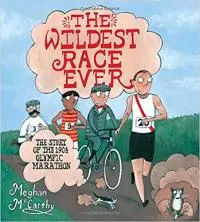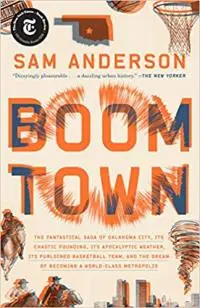I was wrong about what an “adult slumber party” is. Turns out it’s a polite way to advertise that you’ll go to a house and sell a group of people dildos.
I was wrong when I figured that red and white wine were interchangeable when you were cooking.
I was wrong when I was a kid and I figured if I could get my hands on a big enough TV, I’d have way more lines to the top of the screen, and Tetris would be a snap.
Rather than going through a list of times I was wrong (a column I wanted to write that was rejected for reasons of length and taste), my point here is that I’ve been wrong more than a few times, and I’m not afraid to admit it.
The last few months have been an embarrassment, just generally, and an embarrassment of riches in terms of books. Books that will teach us empathy, books that will provide a new perspective. Books that came out decades ago and are just now getting their due. And a lot of these books and lists of books are set on the table with an implied or explicit, “Reading will make things better.”
What if we’re wrong? What if books are not the answer to our problems?
Cue Anger In 3...2...1...
Before you fire up the outrage machine, indulge me for a few seconds while I talk about giving rat poison to athletes.
In the 1904 Olympic Marathon, runner Thomas Hicks was denied water and instead given a mixture of strychnine and egg white. MORE THAN ONCE. Why? Because as the book The Wildest Race Ever puts it:
It was the early 1900’s, and science wasn’t as advanced. Hicks’ trainers thought giving him this was a good thing to do.
The Wildest Race Ever is written for children, and it does a great job distilling a difficult question: Why did people do something so wrong? They thought it was a good thing to do.
I do think books CAN help. I think books HAVE helped. I’m a personal example, and I’ve witnessed it in others. But what’s in the gap between what I THINK and what I KNOW?
We’re offering books as a solution to some big-ass, longstanding, complex issues that affect everyone. Issues that won’t be resolved until we can all get on approximately the same page. I’m a fan of the goals, and what I’m questioning is the methods of getting there.
What if books aren’t the answer?
What If Books Aren’t Good Vehicles?
 Reading isn’t for everyone. For a long time, this has been an intellectual distinction. If you’re smart, you learn about the world through books. If you’re dumb, you don’t.
Reading isn’t for everyone. For a long time, this has been an intellectual distinction. If you’re smart, you learn about the world through books. If you’re dumb, you don’t.
I’m not so sure this is true.
When I replaced the spark plugs and ignition coils on my car, watching a YouTube video was WAY more helpful than a written text. I get information from a video that I don’t from a book. I see exactly where a bolt is from the perspective I’ll be using. I can gauge how much effort it takes to turn that bolt. I get a better idea how long something is going to take.
When I hear someone over the phone, I get tone, I get speed, I get other things that don’t always come through in print.
Are books the best way to convey information, emotional or otherwise? Or have they been the primary method so long because they’re relatively easy to create, spread, and reuse? Does the popularity of the book as information vessel need a reevaluation in light of new technologies being so readily available to so many people?
Are Books Usable For Enough People?
Illiteracy rates are one thing. 19% of adult Americans can’t understand a newspaper. The collections of words are completely meaningless to them. Another 50% can’t read a book written at an 8th grade level. Pile on top of that the need to get nuanced emotion and complex philosophies from a book...
If something like a quarter of your neighbors can’t even understand the collection of words, how surprising would it be if half your neighbors couldn’t really evaluate what was said, mull it over, and make good use of it?
How good is a tool that works for half the population?
Do Books Take Too Long?
If you’re speedy, a book can take 5 or 6 hours, easy. Is this a reasonable ask of most people?
Picture the person you have to. Picture the person working multiple jobs who, if they get an extra two hours in a week, immediately falls asleep. Picture the lazy person who just doesn’t want to. There are an awful lot of people who, for whatever reason, won’t spend 5 hours reading in the next year.
There are people who can’t spare the time, people who won’t spare the time. Regardless of the reason, all of them fall in the category of don’t.
Do We Trust the Research?
We’ve all heard the research that reading, especially fiction, makes you a more emotionally-intelligent, empathetic person.
Most of the data on this comes from a single study which has not been replicated, was based on a flawed test, was completed via Amazon Mechanical Turk (if you don’t know what that is, you can make a few cents, maybe even a dollar, by taking surveys or performing other tasks, so the idea is to do them as fast as possible), may not have measured what it was meant to, and, most damning of all, proved correlation without causation.

Causation and correlation are a huge problem in trying to reverse-engineer human behavior, but I’ll make a quick stab at it: A shrimpy kid in junior high might say, “I was watching high school football, and most of those kids are big.” And then this observer, who’s not too bright, would join the football team, thinking he’d grow as a result. Yes, football players tend to be big. No, playing football is not what causes them to be big.
Are lifelong fiction readers more empathetic because they’ve been reading a lot of fiction, or do they read a lot of fiction because they’re empathetic, and therefore this material has always appealed to them? Did the fiction habit create empathy, or did the empathy always exist and the fiction habit was a natural fit?
Not to put too fine a point on it, but Comparative Literature Professor Arnold Weinstein said:
People used to comment that the people who ran the concentration camps probably knew Goethe and Schiller by heart.
So, even if fiction creates empathy, there’s been no study on the application of any empathy learned through reading.
Much as I hate to say it, I think we believe the study that says fiction makes empathy because we want it to be true. Because WE read, and we want to think of ourselves as empathetic.
My artsy side wants to believe it’s true. My science-y side doesn’t think this one passes the sniff test. Even with my deviated septum and overabundance of nose hair, something smells off.
The Morning After
We do a good job of encouraging people to read something, but when it comes to connecting books to real life AFTER they’ve been read, there’s just not a lot out there.
This is some of the secret sauce that made Oprah’s book club work. It wasn’t like a book was announced, you read it, and that was the last time you ever heard about it. You’d see ongoing discussion, you’d see the author talk about it. And you’d know that millions of other people read it, or at least had bought a copy and read 3% of it.
People who push books are like math teachers who give students a pile of worksheets, and then never collect them, grade them, or ask how it’s going. Oh, and the students have to buy those worksheets themselves. And we walk away feeling like we really helped someone.
And by the way, many workplaces have tried to do book clubs to bridge this gap. I applaud the effort, but can someone honestly discuss a sensitive topic when the person holding their paycheck is heading up the chat?
Not A Rosy Picture
 When I ask about the ways we might be wrong, that books might not be the answer, it’s a downer.
When I ask about the ways we might be wrong, that books might not be the answer, it’s a downer.
But maybe we shouldn’t count books out just yet. Maybe books can adapt, and maybe we can adapt them to be more useful tools for change.
Squash The In-Fighting
The aforementioned reading empathy studies got derailed pretty fast because there was a battle about the difference between literary fiction and popular fiction. In the study, readers of “literary” fiction were found to be more empathetic than those of popular or genre fiction.
This turned the whole thing into an in-fight between book nerds. This is not the kind of fight that gets a lot of pay-per-view buys.
In-fighting about books and genres is the kind of thing that turns non-readers off right away. They don’t know the terms, they don’t understand the passion, and the last thing ANYONE needs is another online fight to get involved in. And, it makes them say, "Shoot, I don't want to waste time reading the wrong kind of book."
Instead of fighting with each other about petty shit, let’s look at the real work that needs doing: Getting non-readers to read.
Writers: Make It Faster
As much as I was interested in Boom Town by Sam Anderson and its detailing of the weirdness that is Oklahoma City, I checked out some of the specs and said, “While I’m interested, damn, I’m not 448 pages interested!”
One academic told me, in confidence, that White Fragility was a good, 14-page academic paper that was inflated into a book, and those extra pages exist only so the thing has enough width to sit on a bookstore shelf.
Create your art, everyone. Do your thing. And if you want that art to make change, if you want your audience to get your message and act on it, you might reach more people if you give them something they can read in the time required to take a dump.
By the way, faster doesn’t always mean shorter, it means faster. Whether your book is faster because it’s half the length or it’s faster because you’ve written it in a way that’s easier to understand, making your book faster extends its reach.
Read and Recommend Books for Kids
As an adult, I read many a book of non-fiction intended for children. They are great because:
- They are brief
- They give you what you need to know
- They expect their audience to know NOTHING about the subject, so they explain EVERYTHING in simple terms
- They know that keeping an easily-bored reader interested is part of the game.
The aforementioned children’s book about the first marathon, The Wildest Race Ever, was amazing. I read a children’s book about the invention of Day-Glo, and it was awesome. The children’s book about Philip Petit is way faster than the movie, and it’s way better.
Push these on yourself, and push them on other people. They really work, and they’re accessible for people of different reading levels and different levels of knowledge going in.
Making and Consuming
It might be that books ARE the answer, but I’m starting to think it’s in creating, not consuming, that we find ourselves renewed.
All the people you recommend books to, have you told them “I would read a book you wrote”? Because you should. Sometimes that’s all it takes to push someone over that edge.
Keep Asking Questions

When we hear the word “panacea” most of us think of a miracle cure, a one-stop Swiss Army knife of a pill that gets rid of hemorrhoids, joint pain, and corrects your vision in one go. The word "panacea" comes from a goddess, Panacea, who was able to cure any malady.
Panacea is not real in medicine. Any physician will tell you that. What helps one patient is going to be the precise wrong thing for another. There is no cure-all. Except possibly pizza.
When we think of social, political, and societal problems, not many of us use her name, but we still harbor hope that Panacea, in some form, will save us. That the next form of this goddess will come and solve world hunger, climate change, inequity of all kinds, and wipe out all of the problems we’ve built for ourselves.
I’m a pessimist. I don’t think Panacea is coming to save us. And if she’s taken the form of books in an attempt to do so, she blew it.
As a book person, I’m inclined to believe in the power of reading. And I also see book people, myself included, unwilling to even consider that books might not be the answer to every problem for every person.
So let’s do it. Let’s consider it.
If it turns out I'm wrong and books ARE the answer, then we’ve reaffirmed what we’d hoped, and we’ve come up with reasons why. We can better advocate for them. We can make them better. We can be more precise, more cunning with the ways we’re writing, selling, and using books.
If they aren’t the answer, then maybe we can admit that and move in a new direction. Or, maybe we can look at their shortcomings and make a better attempt at using them for the purpose of change. Maybe books aren’t the answer to one problem. Maybe they’re the answer to another. Maybe they’re art, and maybe art is antithetical to purpose.
Whatever conclusion you come to, let it be complicated. Let it be something new. Let it be something that you wrestle with, and once you think you’ve got it pinned, wrestle with it again. Ask yourself the hard question because the hard-won answer is worth it.
Buy The Wildest Race Ever: The Story of the 1904 Olympic Marathon by Meghan McCarthy at Bookshop or Amazon
Buy Boom Town: The Fantastical Saga of Oklahoma City, Its Chaotic Founding... Its Purloined Basketball Team, and the Dream of Becoming a World-class Metropolis by Sam Anderson at Amazon

About the author
Peter Derk lives, writes, and works in Colorado. Buy him a drink and he'll talk books all day. Buy him two and he'll be happy to tell you about the horrors of being responsible for a public restroom.







